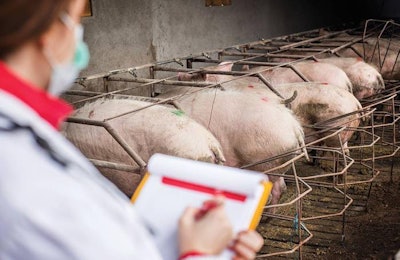
Four European countries record new ASF cases in domestic pigs, suspect cases in Western Africa
Romania has been battling African swine fever (ASF) since the middle of 2018, and a further 49 outbreaks have been reported over the past 10 days. Almost 4,000 domestic pigs have been lost to the disease as the result of these outbreaks.
As with the great majority of ASF cases until now in Romania, most of the animals belonged to backyard herds, according to the official report to the World Organisation for Animal Health (OIE). They also occurred across much of the country. One significant recent exception was the involvement of a farm in the eastern county of Braila. Here, six pigs died out of a herd of 3,175 animals in early October, and the rest of the herd has been culled. Other outbreaks were typically in herds of no more than 50 pigs.
Poland’s agriculture ministry has recently informed the OIE of two new ASF outbreaks on farms. Affected were a herd of 71 pigs in the eastern province of Lublin, and a group of four domestic animals in neighboring Podlaskie. These bring the country’s total in this sector so far this year to 48.
After an absence of almost two months, ASF returned to Poltava in eastern Ukraine in mid-October. According to the official report to the OIE, the national veterinary service reports the disease at a farm with 50 pigs, nine of which died. The rest have been destroyed.
In Bulgaria, the presence of the ASF virus has been confirmed at a small farm in the northeastern province of Shumen. Among the 68 pigs on the farm, four died and the others have been culled, according to agriculture ministry’s report to the OIE.
Up to October 13, there have been 1,676 confirmed outbreaks of ASF among domestic pigs in Europe so far in 2019, according to the European Commission (EC). From this source, by far worst affected has been Romania (1,502 outbreaks). Poland has 48, Bulgaria 39, Ukraine 37, Lithuania 19, the Republic of Serbia 18, Slovakia 11, and Italy and Latvia, each with one outbreak. EC figures do not include cases in Russia.
There have been no new ASF cases reported in the Republic of Moldova over the past two weeks. After a period without new cases, the national food safety agency has informed the OIE that the disease situation has been “resolved” in two regions in the south of the country — Cimislia and Cantemir.
Ukraine’s animal health agency has similarly declared to the OIE that the ASF situation is over in its northwestern province of Volyn. There have been no cases in the area since three wild boar found dead in July tested positive for the virus.
Belgium takes new approach to ASF control in wild boar
First cases of ASF among wild boar in Belgium were reported in September 2018. Since then, 827 of the 3,939 wild boar sampled have tested positive for the virus, according to the Walloon government.
Local authorities have used a range of measures to control the spread of the virus, which appear to have contained the disease to a section of the province of Luxembourg.
Forest areas that had been re-opened for public access during the summer have been closed again this month to allow an official cull by shooting to be carried out safely.
Here, ASF appears to be entering a new phase of the epidemiological cycle, according to the officials. There has been a steady decline in the number of boar found dead in the area over recent months. No animals have tested positive for the disease since August 11.
There has been concern about the emergence of seropositive individuals that could spread the virus further. This has led the regional government to initiate the culling policy.
New ASF cases in wild boar in 6 European states
Poland’s agriculture ministry has reported the highest number of new cases of ASF among wild boar to the OIE over the past 10 days. A total of 94 animals tested positive for the virus between July 7 and July 25, according to the official reports. As before, all the animals were found in the eastern provinces of Warmia-Masuria, Mazovia, Lublin and Podlaskie.
Other European countries recently reporting ASF in their respective wild boar populations were Hungary (45 animals), Romania (41), Bulgaria (11), Latvia (4) and Slovakia (1).
This year, there have been 4,777 confirmed outbreaks of ASF among European wild boar up to October 13, according to the EC. Poland has reported the most outbreaks (1,793), followed by Hungary (1,168), Romania (514), Belgium (479), Lithuania (381) and Latvia (255). Other European states reporting outbreaks in wild boar during 2019 are Bulgaria, Estonia, Italy, Slovakia, and Ukraine.
Africa: Suspected outbreak in Ivory Coast
ASF is suspected as the cause of illness and mortality in pigs in the village of Dabrousa in the department of Bouaflé, according to AIP, the West African country’s press agency. While investigations are ongoing, local officials have called on farmers to stop the movement of pigs and pork, and cease visiting each other’s farms. Veterinary services are urged to be extra vigilant for signs of the disease.
Bouaflé is located in the Sassandra-Marahoué district in central Ivory Coast (also known as Côte d’Ivoire). It shares a border with Montagnes, where the country’s livestock ministry reported three previous ASF outbreaks. These led to the deaths of almost 12,000 pigs during July and August.
Kenya’s agriculture ministry has recently informed the OIE that there have been no new ASF outbreaks in the country. In late August, the virus was detected at one small farm in Uasin Gishu county.
Other African states that have officially reported ASF cases during 2019 are Ghana, South Africa and Zimbabwe.
View our continuing coverage of the African swine fever outbreak.

















